Be Scam Aware: Do Your Own Research
August 27, 2024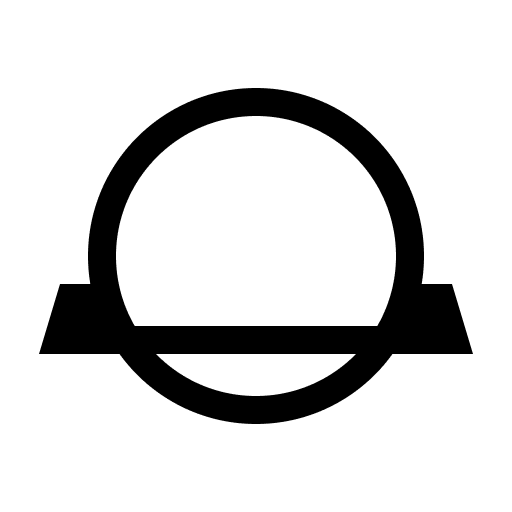
Share this:
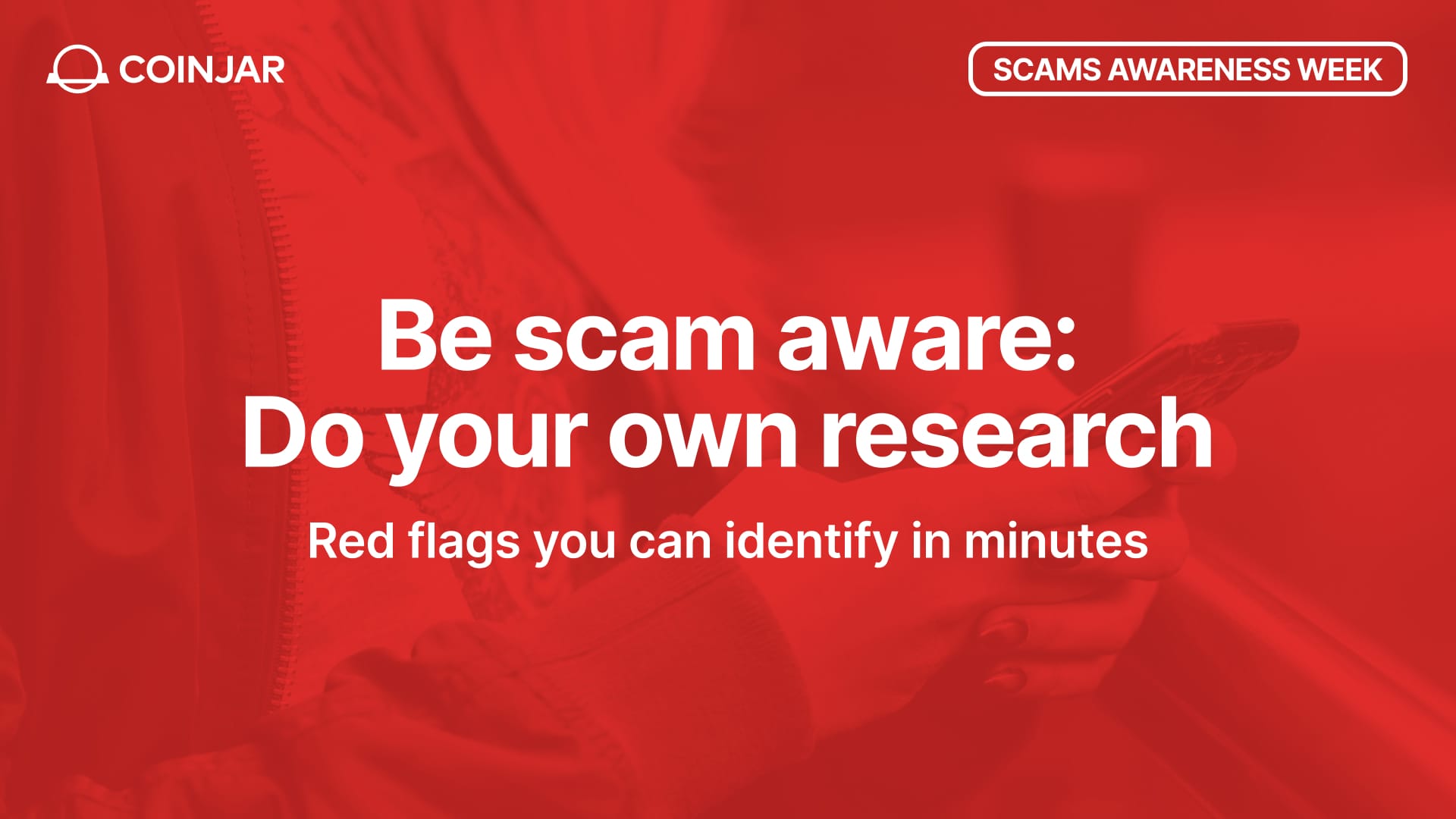
A solid piece of advice is that you should always be doing your own research (DYOR) before becoming involved with any financial opportunity.
But what does doing your own research actually look like? Today we’ll take a deep dive into what it looks like to Do Your Own Research and red flags you can identify in minutes before you decide to get involved with an opportunity online.
How do social media ad scams work?
Like any advertising, social media ads are a gateway to an advertiser. In terms of scams, the goal is to capture your attention and bring you to another website that the scammer has total control over – and that website then perpetuates the scam further, away from the social media platform you started on. Part of the goal of this process is obfuscation – a way to make it difficult for people to find the scam again, report the scam, or even remember how they found the scam in the first place.
Just how bad is the problem?
Unfortunately, it gets worse. As part of Scams Awareness Week 2024, a CoinJar team member volunteered to complete a 5 day surveillance period of potential scam ads on a well-known social media platform, which resulted in 771 ads being reviewed by a human. The volunteer was given 2-3 hours per day of access to scroll through the feed of the social media platform, took photos of every single advertisement, and recorded all results on a spreadsheet. From there, the volunteer reviewed all 750 ads in significant detail, and categorised them.
Over 5 days of surveillance, at 2-3 hours a day, with 771 ads reviewed:
- Approximately 22% of ads were confirmed fraudulent or financial scams
- Approximately 26% of ads were generally suspicious or did not have a visible lawful or economic purpose that would lend legitimacy to the advertisement
That totals ~48% social media ads that appeared to be illegitimate or financial scams over 5 days on a social media platform. While many of the ads were reported, we noted that some ads continued to be displayed to the volunteer days or weeks after being reported.
Looking for a scam
Unfortunately, it’s not hard to find an advertisement online that is a scam. In this case, we’re using an example found on Facebook:

At first glance:
- This appears to be a national service connected with providing grants to those who need it, noting the person in the image is using a walking frame.
- It uses the word “Commonwealth” which in Australia generally carries implies legitimacy and a relation to government bodies.
- We can see photos where real people seem to be receiving cheques in relation to the grants.
- This ad only allows you to visit the advertiser’s social media page, or it lets you send a message to the page directly. There does not appear to be a website directly connected to this ad.
- The ad has 235 likes.
Check the advertiser’s page
Before we message the page to find out more we’ll open the page itself, “Commonwealth Financial Grants Program”, and double check Intro section on the social media page connected to the ad:

We can see:
- the page type has been marked as “government organisation”
- two genuine links listed - one for thecommonwealth.org and one for finance.gov.au. With some research, we immediately know that both of these links are genuine government bodies or representative groups.
Read the page posts
When we look over at the first visible post however, this “government organisation” is promoting a prize draw:

When we check their next post, it’s referenced another Australian government website link, which is genuine, but the content of the post is concerning:

When we visit cgc.gov.au, there is no mention of the Commonwealth Finance Grants Program.When we search Google for the Commonwealth Finance Grants Program we find nothing:

When looked for the page’s earliest post, and it was less than 30 days ago – this very likely means the page is new:
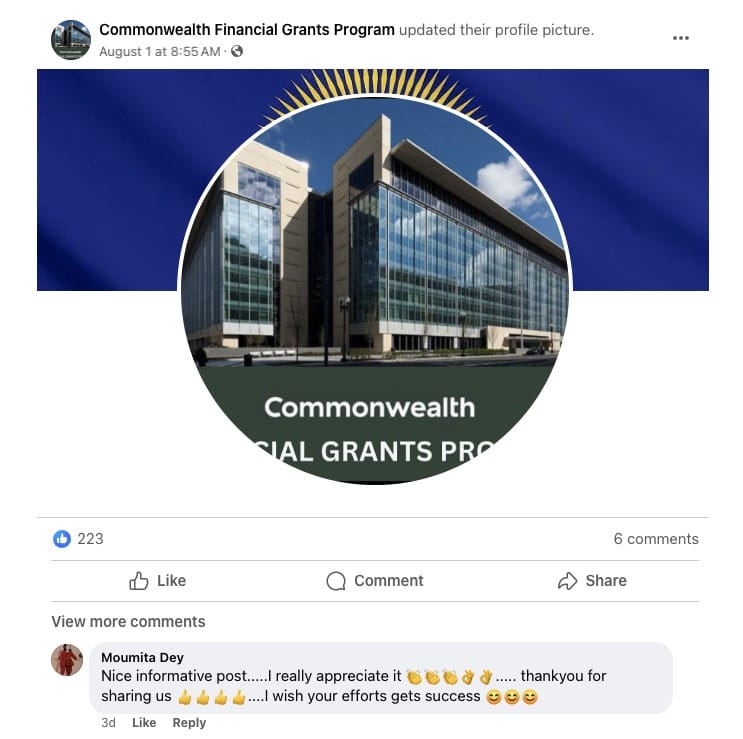
We also decided to do a quick Google search for “Publishers Clearing House” as some of the page posts refer to it. Here’s the first result from Google:
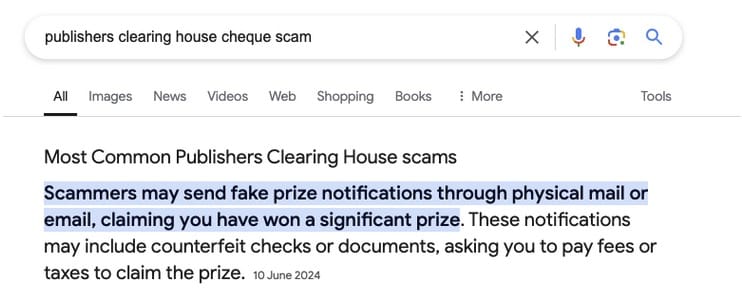
Read the page reviews
When we check the reviews of the page, they’re all positive and there are only recent reviews available from the last 7 days:
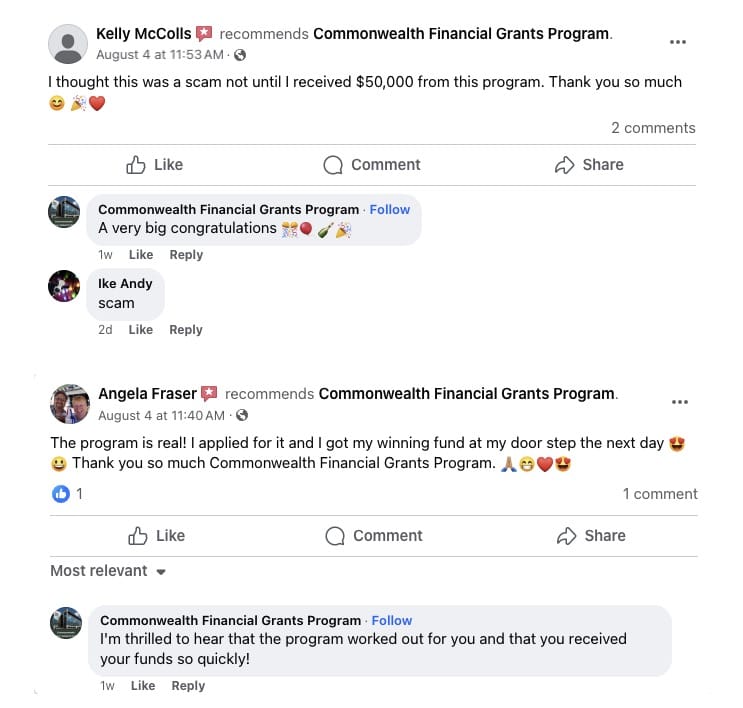
When you check the profiles of the reviewers, there are two broad categories:
- Type 1: Some reviewers appear to be real people with long time post histories and consistent style/behaviour over time.
- Type 2: The other reviewers do not appear to be real people and are bots or accounts created for the sole purpose of perpetuating the scam.
We hear you asking “But CoinJar, why on earth would real people leave a positive review for a scam?”. Great question. There are generally two schools of thinking when answering this question:
- These people are involved in the scam as perpetrators or genuine victims, and have not realised they are involved in a scam.
- These people likely have a stranger maliciously hiding within their social media account and taking actions unbeknownst to the true account owner – like posting positive reviews for scam pages – as that person. This unauthorised access can go on for months or years without the account owner ever knowing, and there are definitely recorded cases where an unauthorised third party was accessing an email inbox or social media account for extended periods of time without the real owner knowing.
The reviewers that appear to be fake accounts have some significant red flags that are easy to identify. These accounts often have:
- no or limited amounts of posts available on their profile
- no or limited amounts of photos that match their profile picture
- unusual posts they’re tagged in, such as images related to other pages (which can also be scams)
- mutual friends with other reviewers of the scam page
Final thoughts: Is it a scam?
Lets run through the concerning things we found through researching this ad:
- The post content doesn’t seem to make sense for a government agency (advertising giveaways and lotteries)
- The “Commonwealth Financial Grants Program” has no results when searched on Google, so it does not seem to be real
- The advertiser’s page seems to be no older than 30 days, with a very short and recent post history
- The advertiser’s page is using official government logos and websites and branding to appear legitimate
- The page’s reviewers were overly positive, and on closer inspection appears they are friends
- Some posts referred to another organisation that could be involved with a common but related financial scam
Based on the information we have just from doing some research on the opportunity it seems likely that this ad is connected to a financial scam.
How do I do my own research?
All you need to do is C.H.E.C.K. before you send money:
C - Confirm Sources
Verify the credibility of the information sources. Make sure the data you're using is from reliable, well-regarded sources.
H - Hesitate
Take several moments to pause and think things through before making a decision. Never make an impulsive decision based on sudden trends or an ad you saw online.
E - Evaluate Risks
Assess all potential risks associated with the investment. Consider the worst-case scenarios and decide if you're prepared for them.
C - Consult Experts
Seek advice from financial advisors or experienced investors. You can also ask for advice from a trusted friend or family member on whether or not an opportunity is legitimate. External insights from others can provide a deeper understanding and help you avoid common scams.
K - Keep Learning
Continuously educate yourself about scams. Staying informed helps you identify scams before you become involved, as well as protect your friends and family from scams.
You can also download CoinJar’s free Spot The Scam Checklist (https://support.coinjar.com/hc/en-us/articles/900003490906-Protect-yourself-from-financial-scams#how-can-i-protect-myself-from-scams) which will help you detect and identify red flags in opportunities.
What did we learn?
Nothing is as it seems, really. Scams can be simple, but many scams are deeply complex networks of layers upon layers of trickery. Doing your own research, or DYOR, before you take any actions with your money could save you from making a huge mistake.
Help fight scams
You can help to fight scams by reporting them to the National Anti-Scam Centre via Scamwatch.gov.au/report-a-scam. Your reports are crucial—they help disrupt scammers, protect others, and prevent financial losses.
Currently, 30% of serious scams are unreported. Reporting can be done anonymously or on behalf of someone else, and with your consent, information can be shared with relevant authorities to further combat scams. You can also report directly to the police at cyber.gov.au/report. Reporting makes a difference.
Share your story
We're encouraging everyone to speak up, share and report scams.
Sharing your story helps others to spot, avoid and report scams, and recover from the harms caused by scammers.
Share your scam story using the hashtag #ShareAScamStory to help make the world a harder target for scammers.
CoinJar Team
CoinJar’s digital currency exchange services are operated by CoinJar Australia Pty Ltd ACN 648 570 807, a registered digital currency exchange provider with AUSTRAC.
CoinJar Card is a prepaid Mastercard issued by EML Payment Solutions Limited ABN 30 131 436 532 AFSL 404131 pursuant to license by Mastercard. CoinJar Australia Pty Ltd is an authorised representative of EML Payment Solutions Limited (AR No 1290193). We recommend you consider the Product Disclosure Statement and Target Market Determination before making any decision to acquire the product. Mastercard and the circles design are registered trademarks of Mastercard International Incorporated.
Google Pay is a trademark of Google LLC. Apple Pay is a trademark of Apple Inc.
This site is protected by reCAPTCHA and the Google Privacy Policy and Terms of Service apply.
Share this:
On/Offchain
Your weekly dose of crypto news & opinion.
Join more than 150,000 subscribers to CoinJar's crypto newsletter.
Your information is handled in accordance with CoinJar’s Collection Statement.
More from CoinJar Blog
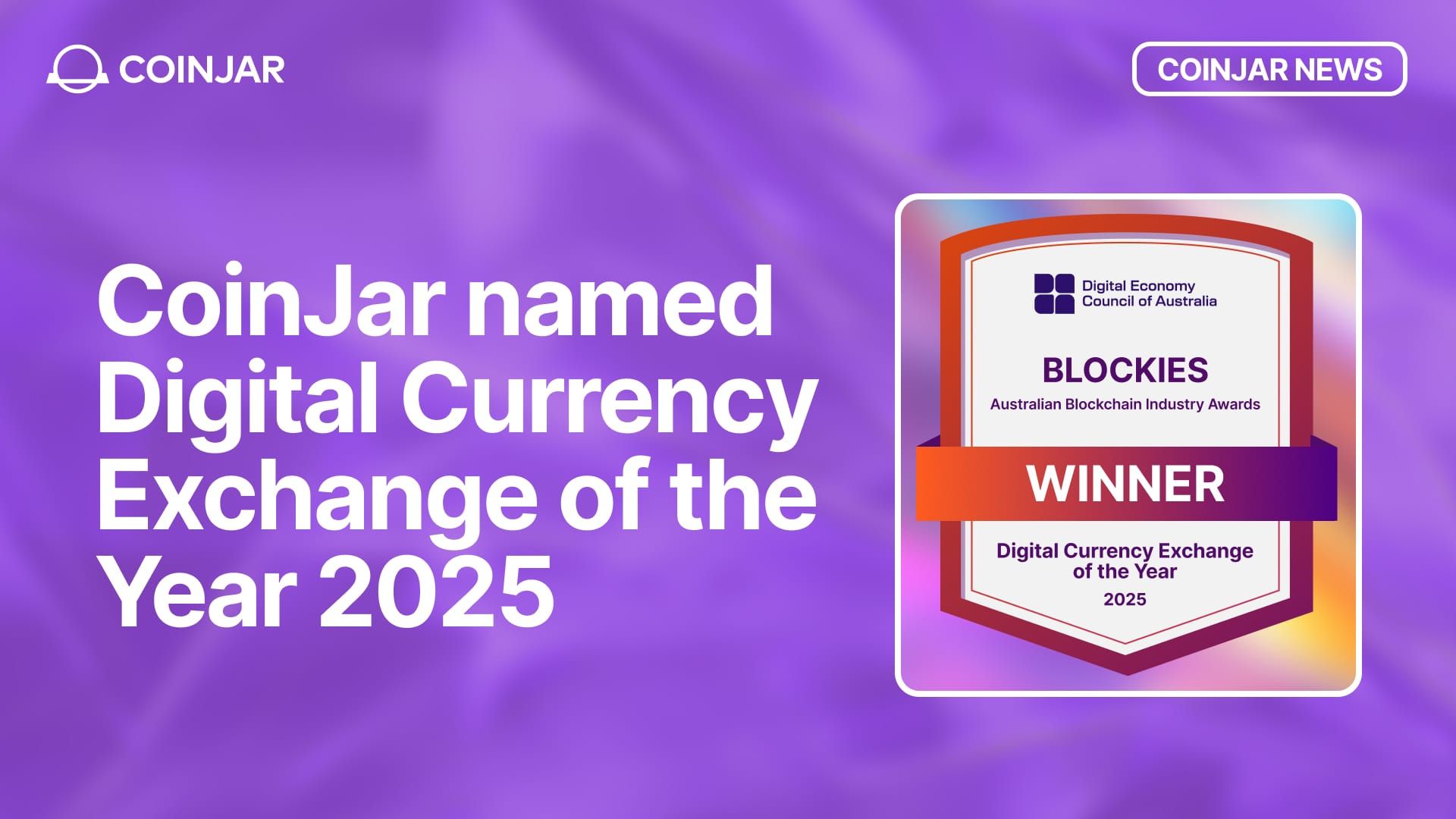
CoinJar Named Digital Currency Exchange of the Year at The Blockies 2025
December 18, 2025We are proud to announce that CoinJar has been awarded Digital Currency Exchange of the Year at The Blockies 2025, Australia's premier awards recognising excellence in...Read more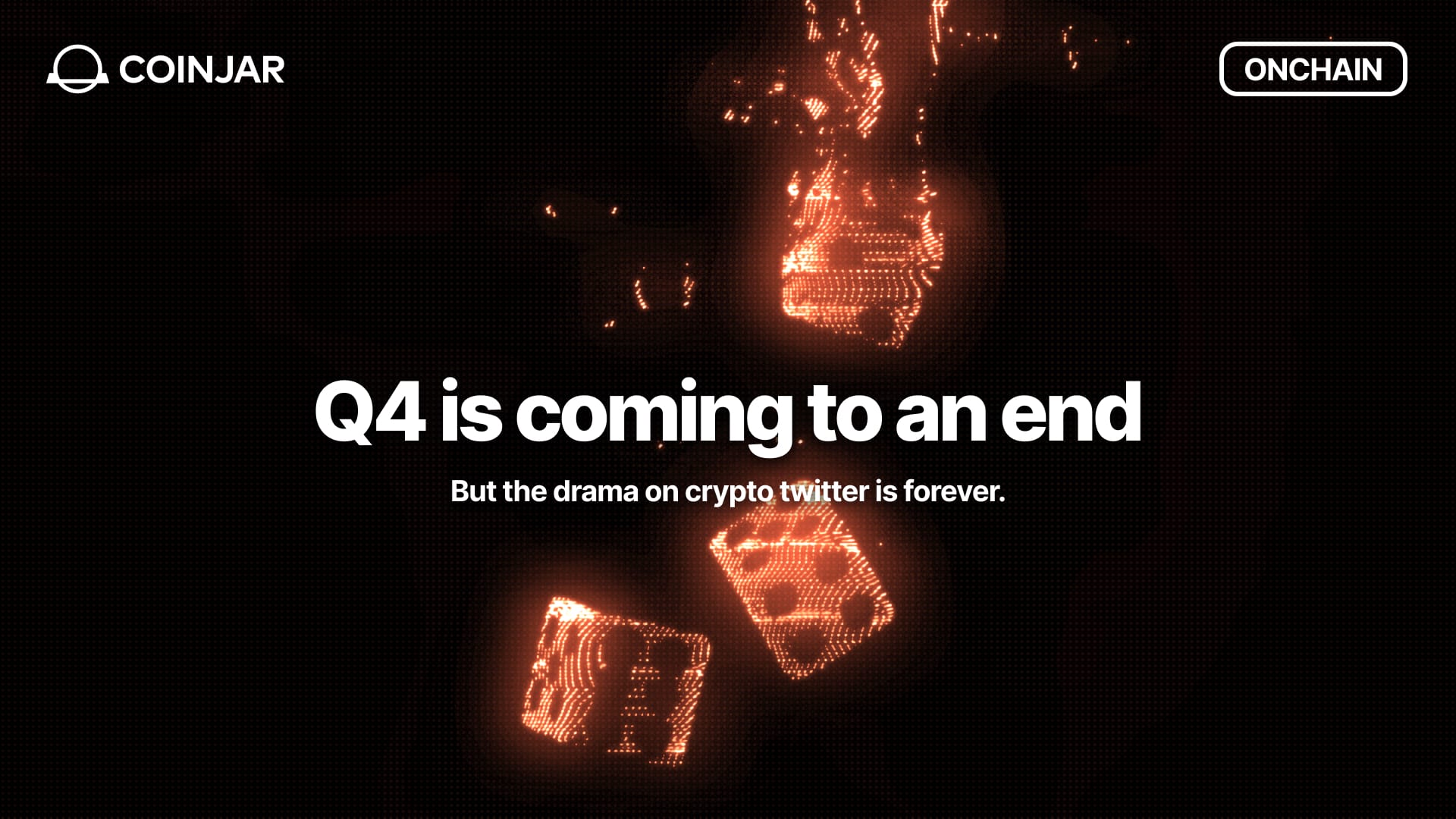
Onchain: Q4 is coming to an end
December 17, 2025But the drama on crypto twitter is forever. Story One EoY reflections kicking in At least if you are to believe the one X article that has been all over my feed in the...Read more
Introducing CoinJar AI
December 9, 2025A portfolio and market assistant built into CoinJar We are pleased to introduce CoinJar AI in the US and Australia. CoinJar AI understands your portfolio, tracks the market,...Read moreYour information is handled in accordance with CoinJar’s Collection Statement.
CoinJar’s digital currency exchange services are operated by CoinJar Australia Pty Ltd ACN 648 570 807, a registered digital currency exchange provider with AUSTRAC.
CoinJar Card is a prepaid Mastercard issued by EML Payment Solutions Limited ABN 30 131 436 532 AFSL 404131 pursuant to license by Mastercard. CoinJar Australia Pty Ltd is an authorised representative of EML Payment Solutions Limited (AR No 1290193). We recommend you consider the Product Disclosure Statement and Target Market Determination before making any decision to acquire the product. Mastercard and the circles design are registered trademarks of Mastercard International Incorporated.
Google Pay is a trademark of Google LLC. Apple Pay is a trademark of Apple Inc.
This site is protected by reCAPTCHA and the Google Privacy Policy and Terms of Service apply.